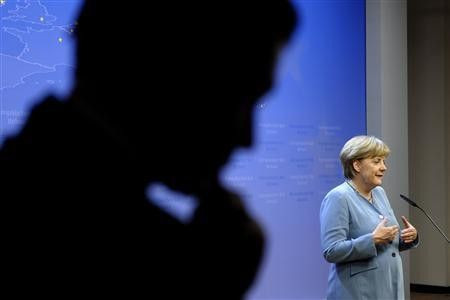Euro Summit 2012: EU Leaders Prepare For Failure Ahead Of 'Make-Or-Break' Meeting

After months of dithering and a flurry of promises at last week's G20 summit in Mexico, there are high hopes for Thursday's make-or-break EU summit.
At stake, according to analysts, is nothing less than the future of the euro and possibly of the European Union itself, with markets and global leaders demanding tangible solutions to Europe's rapidly degenerating debt crisis.
But while investors and global leaders grow impatient for a definitive action plan, the chance of concrete solutions emerging by the end of this week looks increasingly unlikely.
There has already been one dropout: Brand-new Greek Prime Minister Antonis Samaras will not attend as he convalesces after surgery following a detached retina.
In his place, debt-ridden Greece will be represented by President Karolos Papoulias.
Following the news of Samaras' no-show, on Monday Spain officially asked for up to €100 billion ($125 billion) in loans to rescue its banking sector, joining Portugal, Ireland, Greece and -- as of Monday afternoon -- Cyprus in the bailout club.
The Spanish request came as the country also battles sky-high -- and according to investors, unsustainable -- borrowing costs, with the benchmark Spanish 10-year bond up 15 basis points Monday morning.
As if that wasn't enough, German Chancellor Angela Merkel has dashed what little hope there was that Europe would issue joint euro zone bonds, describing the debt-sharing proposal as economically wrong and counterproductive.
Speaking on Monday, the austerity-minded chancellor told a conference on Berlin: When I think of the summit I feel concerned that yet again we will have too much focus on all kinds of ways of sharing debt, Reuters reported.
Also standing in the way of an agreement is the European Union's political structure.
The fact that each member nation has to ratify decisions -- such as the creation of a central banking authority -- makes agreement a notoriously difficult process prone to fatal holdups.
Likening the union to the biblical Tower of Babel, Reuters journalist Paul Taylor notes that Europe's Babel features 27 often fierce national debates in member states, each of which has the power to block any change to EU treaties, including 10 countries which are not members of the currency.
In one corner stand France, Italy and Spain, who are all looking to share the debt burden across member states.
This broadly anti-austerity group, led by French President Francois Hollande, is pushing for a stronger banking union, the apparently doomed euro bond, and the ceding of further fiscal sovereignty to Brussels.
In the other is Germany, the continent's biggest economy and its largest bailout contributor.
Led by Merkel, whose political existence may depend on slaking her electorate's thirst for punishing the profligate nations, the Germans want to enforce budget responsibility, budget cuts and market reforms to make Europe more competitive.
On top of these basic differences, any proposals now face scrutiny from an electorate increasingly hostile to the very idea of the euro and in some cases to the European Union itself.
Across the continent, fringe anti-euro and anti-Brussels parties are springing up as membership in the single currency seems to have brought only insufferable national debt for the Mediterranean nations or damaging bailout responsibility for their Northern cousins.
A survey from the Washington-based Pew Research Center in May showed that from Athens to Amsterdam, skepticism towards the entire EU project had reached alarming levels.
Italians, historically a Europe-friendly group, were particularly hostile, with 40 percent of those polled saying they wanted to return to the lira, while 54 percent of Spaniards polled said they doubted the value of continued EU membership.
The situation is so dire that, according to billionaire financier George Soros, European nations have just three days to solve their differences, or risk a total and fatal failure come Thursday.
Unless that is resolved in the next three days, then I am afraid the summit could turn out to be a fiasco. That could actually be fatal, Soros told Bloomberg.
For several weeks the outspoken investor has been hammering on the idea that the current crisis should be used to form a closer union in Europe, but was previously sympathetic to the German political stance, noting in an early June speech that the German public cannot understand why a policy of structural reforms and fiscal austerity that worked for Germany a decade ago will not work for Europe today.
He is also highly critical of German insistence on enforcing strict budget cuts in return for loans to make their bond payments.
Merkel has emerged as a strong leader, Soros said. Unfortunately, she has been leading Europe in the wrong direction.
In one sense, though, failure on Thursday may not affect markets as much as some investors fear.
With Italian and Spanish stock indices closing down 4 percent on Monday, it looks as if increasingly skeptical investors are already preparing for disappointment.
© Copyright IBTimes 2025. All rights reserved.





















